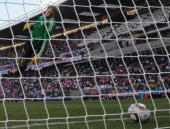By Andrew Warshaw at Celtic Manor
March 4 – Football’s lawmakers will once again tackle the age-old question of goal-line technology tomorrow in an attempt to finally achieve a breakthrough over one of the most burning issues facing the game.
Goalline technology is the main item on the agenda of the 125th meeting of the International FA Board (IFAB), comprising FIFA and the four British home associations and taking place this year close to Newport in Wales.
A year ago, the IFAB ruled out any further developments but that all changed during the World Cup when FIFA President Sepp Blatter performed a surprising u-turn and called for further research following a spate of controversial incidents, not least Frank Lampard’s “goal that wasn’t” for England against Germany.
Last month, 10 different systems – some involving cameras, others a microchipped ball – were tested by a Swiss research group but all failed the strict criteria of 100 percent accuracy and transmitting to the referee within one second whether a goal has been scored.
Significantly, the system developed by Hawkeye and used successfully in other sports was not one of those tested, since theirs needed a stadium environment to prove itself.
Hawkeye remain confident its system would pass those tests – the firm is in the process of being taken over by a larger company, and it will be keen for IFAB to give guarantees that it at least accepts the principle of goal-line technology.
If not, Hawkeye’s new owners may be wary of investing even more money in adapting the system to football following a spate of past rebuttals.
Despite the failure of all 10 systems to meet the criteria, it is understood IFAB will approve more experiments tomorrow, even though there is a long way to go before any hi-tech device for helping to decide whether the ball has crossed the line can become law.
IFAB are the guardians of the game and any new proposal needs the support of FIFA and at least two of the four home associations.
In the past Northern Ireland and Wales have joined FIFA in opposing the official introduction of goal-line technology.
But it is understood they are leaning towards supporting the English and Scottish FAs.
One man strongly opposed to any further experiments is UEFA President Michel Platini. Although not a member of IFAB, he has considerable influence and is a strong advocate of the alternative system of two extra officials, one behind each goal.
Platini will doubtless argue that two systems running concurrently is unworkable especially if, as seems likely, IFAB allows UEFA to continue with its five officials system at next year’s European Championship finals in Poland and Ukraine.
Other proposed law-changes being discussed include the fairness of the triple punishment of penalty, dismissal and suspension for red cards; players wearing snoods and coloured tights; and referees using “vanishing spray” to mark where defensive walls stand.
Contact the writer of this story at zib.l1743717004labto1743717004ofdlr1743717004owedi1743717004sni@w1743717004ahsra1743717004w.wer1743717004dna1743717004
Related stories
February 2011: Goal-line technology on the agenda for FIFA
January 2011: Blatter on collision course with Platini
January 2011: Platini rules out goal-line technology
October 2010: Platini claims goal-line technology will lead to “PlayStation football”
October 2010: Goal-line technology “must give decision within one second”
